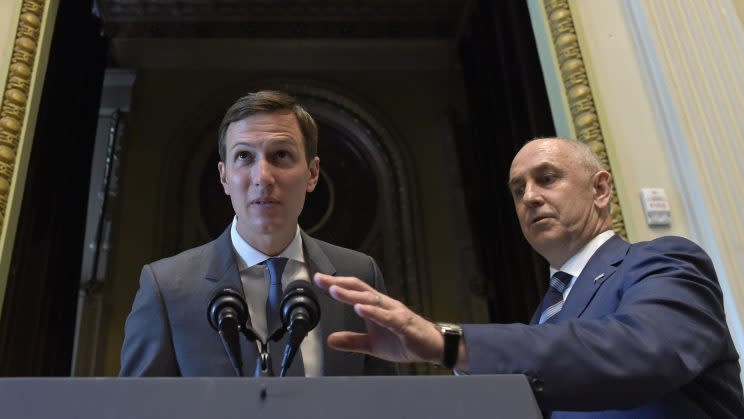Silicon Valley giants that would benefit from Kushner tech reforms to government

Amongst the tasks in his portfolio, President Trump’s son-in-law Jared Kushner is overseeing the White House Office of American Innovation, a new agency charged with modernizing the government’s dated technology. Kushner has said he wants the government to be run like a “great American company.”
On Monday Silicon Valley heavy hitters descended on Washington, DC, to strategize these changes to the government’s tech infrastructure, with Kushner and former Microsoft (MSFT) CFO Christopher Liddell, Trump’s director of strategic initiatives, leading the charge.
The guest list was a who’s who of Silicon Valley CEOs. Mastercard’s Ajay Banga, Amazon’s Jeff Bezos, Oracle’s Safra Catz, Apple’s Tim Cook, Palantir’s Alex Karp, Intel’s Brian Krzanich, SAP’s Bill McDermott, Microsoft’s Satya Nadella, Adobe’s Shantanu Narayen, IBM’s Ginni Rometty, Acceture’s Julie Sweet, and more. Alphabet’s executive chairman Eric Schmidt was also present.
Liddell’s strong ties to Silicon Valley make it possible that this government modernizing—which was a goal of the Obama administration as well—stand a greater chance of happening, especially since Kushner carries significant Trump influence as a family member.
“We certainly know the problems,” Liddell said at the White House. At the meeting, the grievances with vintage technology were aired, including the go-to complaints about floppy disks for the US nuclear program. “We have some of the ideas about what the solutions are. But we really want to engage your minds and get the best of the private sector applied to these problems,” Liddell said.
Given Silicon Valley’s tech prowess and the pro-private sector stance of the Trump administration, implementation of new IT infrastructure would be a massive opportunity for tech companies.
According to Ian Shafer, founder and CEO of Deep Focus, a digital strategy firm, the businesses most likely to get involved are companies with extensive database experience.
“The businesses that are most able are likely to be these companies—Microsoft, Oracle, IBM— with rich history with complex databases that communicate with each other while having security,” Shafer told Yahoo Finance.
This puts companies like Microsoft, Oracle (ORCL), Google (GOOG, GOOGL), Amazon (AMZN), and Salesforce (CRM) in a good position to benefit, given their extensive experience in providing large-scale tech solutions.
This doesn’t necessarily mean more consumer-facing companies like Apple (AAPL) are going to be left out of the fun entirely, though the iPhone maker may be relegated to providing “user experience” insights because it doesn’t have the B2B experience of the other tech giants.
A changing time
The modernization Kushner and Liddell are championing is a continuation of goals set by President Obama, but increased bipartisan worries about computer system vulnerabilities following the 2016 election have brought a new urgency to strengthening tech infrastructure. More than ever, security is an issue. For these companies, user-friendliness is the easy part, given the customer service obligations of the private sector.
“Tech is the new battleground and hacking is the new warfare—it’s something everyone has to get comfortable with,“ said Shafer. “One of the things we’ve learned is that one of the greatest challenges is getting databases to work together and ensuring they’re not compromised. The more connected, the worse the problems become if they do become compromised.”
One way to tackle the difficulties of robust security for the government’s essential services is redundancy. This means there could be many winners from these tech initiatives if backups and overlapping systems are created and implemented.
“You see what happens to the internet when Amazon Web Services goes down,” said Shafer. “We don’t want the same thing to happen to the government. That could be where redundancies come into play.”
Ethan Wolff-Mann is a writer at Yahoo Finance focusing on consumer issues, tech, and personal finance. Follow him on Twitter @ewolffmann. Got a tip? Send it to tips@yahoo-inc.com.
Read More:
Uber’s series of scandals has yet to put a dent in ridership
Examining Uber’s post-Kalanick future
Leaked audio: Uber’s uncomfortable all-hands meeting
The full list of recommendations on how Uber can improve its workplace
Uber lost 8 executives in under 2 months

